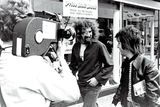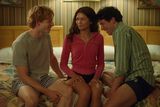Liam Neeson’s Marlowe misses the target in sluggish detective yarn
Film reviews

Marlowe Two stars Select cinemas/Sky Cinema; Cert 15A
For Liam Neeson’s 100th film, the Ballymena giant travels back in time to portray Raymond Chandler’s hard-boiled crime-solver.
Fair enough. Philip Marlowe isn’t necessarily a bad fit for Neeson, but it’s an awkward one for the people around him. Neil Jordan, Oscar-winning purveyor of such undisputed Irish classics as The Crying Game and The Butcher Boy, should have a better handle on proceedings.
Jordan’s Marlowe is, in fact, brimming with Irish talent. It’s based on a John Banville novel – the celebrated author, writing under his Benjamin Black pseudonym, delivered an authorised Marlowe entry, The Black-Eyed Blonde, in 2014.
The great Seána Kerslake appears as a hardened movie star. Colm Meaney dresses up as a detective. Somewhere in the middle, Jessica Lange, portraying a salty screen icon, employs a spot of Joycean wit over a cup of tea. No wonder they’re releasing this thing on St Patrick’s weekend.
What, you may ask, is the problem? Acclaimed director and cast, a tasty premise, a distinctive home-grown flavour – Marlowe sounds like a bit of a blast. It isn’t. Despite good intentions, Jordan’s stilted, sluggish and largely suspenseless detective yarn is all over the shop.
California, 1939. Philip Marlowe (Neeson) begins his morning ritual. Coffee, radio and a solo game of chess – you know the type. At work, his assistant introduces his next employer.
Marlowe is the original private investigator: too clever to play with others, too reckless to hold down a ‘real’ police job. He’s good with words and handy with his fists. He asks all the right questions and makes all the wrong enemies. He’ll find whatever it is you’re looking for.
Enter the enigmatic Clare Cavendish (Diane Kruger), a tricksy, glamorous heiress who would very much like for our weary protagonist to locate her missing ex-lover, Nico Peterson. Marlowe takes the case and soon discovers – shock, horror, gasp – that Nico was recently reported dead.
Someone beat him up and then drove over his face. Clare is aware of such a crime, but insists that the victim wasn’t her Nico. He’s still alive, she protests, and she wants Marlowe to keep chasing.
Read more
What, exactly, is going on, and can Clare be trusted? Your guess is as good as mine, but eventually, Marlowe finds himself knee-deep in a seedy, slippery, gangster-driven entanglement.
The grumpy cops have no choice but to assist. Clare’s mother, Dorothy (Lange), gets involved. There are various Hollywood bigwigs and hoodlums on the margins. Danny Huston (enjoying himself) shows up as a sleazy club owner. Alan Cumming (likewise) portrays a flamboyant mobster. Things get messy.
The initial set-up is fine – it’s the wonky follow-through that confuses matters. Jordan, who shot the film in Barcelona and Dublin, shares a screenwriting credit with Academy Award-winning scribe William Monahan (The Departed). Together they concoct a crooked and, occasionally, impenetrable tale that can’t seem to find its groove.
Poor Neeson, reunited with his Michael Collins director, looks lost. With a tighter, snappier screenplay, Big Liam might have made a proper character out of his Marlowe. Humphrey Bogart and Elliott Gould had their fun with this fella – not Neeson, who appears frustrated with his lot.
The sleepy material requires a basic run-through of the hits. Look, Liamo’s an action man in the 1930s! Watch him bust heads and fire bullets at bad guys! Is there nothing this man can’t do? Same role, different outfit, and you half-expect Neeson to pick up the phone and terrify Lange with a whispery, Taken-esque monologue. It might have made things interesting.
As far as mysteries go, Jordan’s film is as trivial and tiresome an experience as watching a friend struggle to find their car keys. Everyone gets involved. Idiots keep asking where they last saw them. Distraction sets in. The keys will eventually emerge in someone’s pocket, and you’ll forget that any of it ever happened.
Oddly enough, Jordan has cited Blade Runner as an influence – ironic considering that some of the characters here behave like robots. There are no life-like exchanges, everything is too stuffy, too stagey. Every movement is over-thought. All you can see is acting, all you can hear is writing. These are major problems.
Both filmmaker and star have had their off-days. Sadly, this is one of them.
Also on release
Vivian Oparah and David Jonsson in ‘Rye Lane’
Rye Lane Five stars Now showing; Cert 15A
To South London, where Dom (David Jonsson) is still down in the dumps three months after his girlfriend left him for his best friend. At a madcap photography art exhibition, he runs into fellow twentysomething Yas (Vivian Oparah), a wardrobe department worker who has also recently been on the receiving end of a thorough dumping.
She is more sanguine about her situation, and finds herself trying to cheer up the very glum Dom. The pair team up for the rest of the evening and embark on a freewheeling odyssey around the boroughs of Brixton and Peckham. Each offers the other a shoulder to cry on, a foil to help get one up on their respective exes, and some perspective when it feels like they are getting nowhere fast with adult life.
There are no prizes for guessing what develops between Dom and Yas by the finale, but that is to miss the real jewels of this fizzy, primary-coloured romantic comedy.
On her feature debut, director (and former advertising creative) Raine Allen-Miller makes a splash with a film so fresh in look and feel that it stands far apart from most other offerings in the genre. A modern classic? Just maybe. Hilary White
Boston Strangler Three stars Disney+; Cert 16 Loretta McLaughlin (Keira Knightley) is fed up with the lifestyle assignments she is forced to take at the Record American newspaper. When a series of gruesome murders strikes the city of Boston, she convinces her gruff chief editor (Chris Cooper) to let her report on the case.
With fellow journalist Jean Cole (Carrie Coon) partnering with her, the pair delve deep into the workings of a serial killer whose body count is mounting. They quickly come to connect the dots between the all-female victims, something the Boston police department are either unable or unwilling to do.
All the while, the two women must overcome the daily obstacles put in their way by the gender politics of the 1960s.
If you can ignore the annoying cinematography (that insists on blurring out of focus everything but the character speaking), as well as some jarring editing, this historical true-crimer from writer-director Matt Ruskin is serviceable enough and keeps you guessing into its final throes (assuming you’re unfamiliar with the real-life case).
Knightley and Coon duet with the lived-in feel of a seasoned screen pairing. Hilary White
Shazam! Fury of the Gods Two stars In cinemas; Cert 12A
We need to talk about Skittles. Indeed, this shameless, shambolic DC superhero joint might be the first comic-book movie in history to interrupt itself with an advert. It happens somewhere around the middle, when a group of foster kids face off against a deadly army of CG nasties.
Don’t ask me why, but this noisy, nonsensical stand-off involves a famous brand of sweets. The bag is in full view – one of the characters whispers the company tagline. That sort of rubbish wouldn’t fly in a Marvel flick.
The first Shazam! outing was a hoot. It successfully combined the endearing, goofball energy of Penny Marshall’s Big with the plucky sci-fi charm of Richard Donner’s Superman. In contrast, this bulky, effects-heavy follow-up is a joyless mess.
The plot – Zachary Levi’s anxious, magic-wielding man-child battles furious gods with his nerdy foster siblings – is a tad underdeveloped. The half-drawn baddies (Lucy Liu and Helen Mirren, barely trying) are instantly forgettable. It’s constantly explaining itself, and I’m sorry, but the city-size dome trap bit is lifted straight out of The Simpsons Movie. Do better, DC. Chris Wasser
Read more
Join the Irish Independent WhatsApp channel
Stay up to date with all the latest news
















